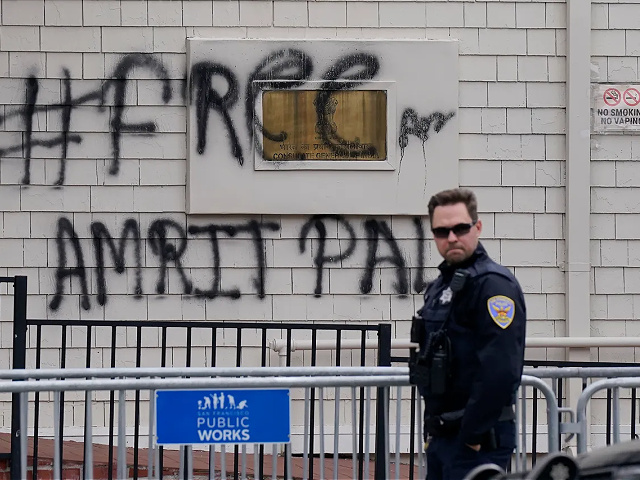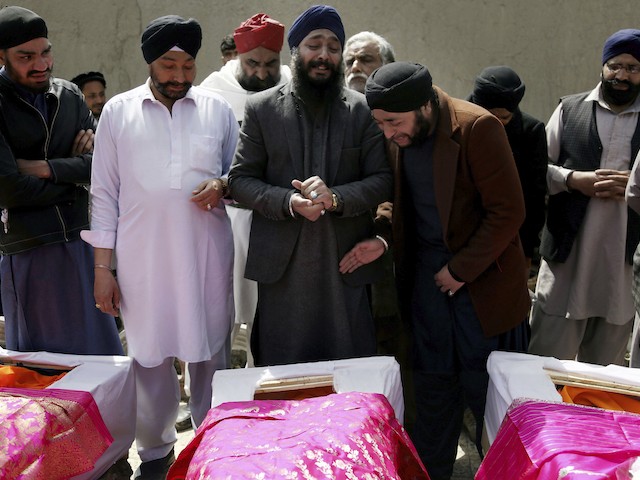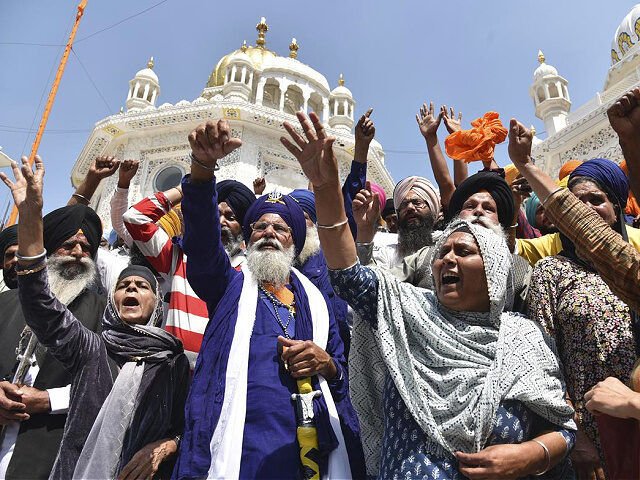A growing conflict between India’s Hindu-majority government and Sikh separatists spilled over into Canada on Saturday, as hundreds of Canadian citizens with family ties to India’s Punjab gathered in Vancouver to protest reported human rights violations by Indian security forces.
The source of the controversy is India’s manhunt for Sikh separatist leader Amritpal Singh, a 30-year-old Punjab resident who heads an organization called Waris Punjab De.
Singh is a self-declared Sikh cleric who was relatively low-profile until last year when he returned to Punjab from a lengthy sojourn in the United Arab Emirates (UAE) and styled himself as the spiritual successor to Sikh separatist leader Jarnail Singh Bhindranwale.
Bhindranwale was killed in 1984 when Indian Prime Minister Indira Gandhi ordered a massive assault on the temple where his Khalistan movement was based. Khalistan is the Sikh name for an independent homeland, although some members of the movement – purportedly including Bhindranwale – also used the term to mean a state of mind, a return to Sikh traditions that would not necessarily involve seceding from India.

A San Francisco Police Officer stands outside of the entrance to the Consulate General of India in San Francisco, Monday, March 20, 2023. San Francisco police had erected barriers and parked a vehicle nearby as people protested outside the Consulate General of India to protest the capture of Amritpal Singh. (AP Photo/Jeff Chiu)
Amritpal Singh revived the languishing Khalistan movement through social media, which he employed with considerable skill, rapidly building a hefty international audience. The Indian government viewed his success with mounting alarm, having bad memories of Khalistan separatism from the 1980s.
Matters came to a head in February when a member of Waris Punjab De named Lovepreet Singh Toufan was arrested in Punjab for starting a riot and kidnapping a man who had a dispute with members of the cult. Toufan was reportedly a veteran of the massive Indian farmer protests before joining Khalistan, a detail that did not endear him to the authorities.
Amritpal Singh was allegedly involved in the riot and beating that landed Toufan in jail, but before the police could serve an arrest warrant on him, Singh and a mob of followers wielding guns and swords stormed the police station. Singh and his crew claimed they had evidence that Toufan was innocent of the charges. Either this evidence, or their ample supply of firearms and cutlery, was apparently persuasive because Toufan was soon released from jail to a hero’s welcome from fellow Waris Punjab De members.
Singh has been on the run from Indian authorities ever since, to the immense frustration of Indian authorities and the growing admiration of followers who view him as a legendary outlaw. Singh’s admirers say Waris Punjab De is a social welfare organization, not a separatist group or terrorist gang, and they insist Singh was justified in storming the police station in February because Sikhs must forcefully insist on equal treatment before the law.
India has been pulling out all the stops to catch Singh, to the alarm of human rights advocates who say the entire population of Punjab is being persecuted. The government is shutting down social media accounts belonging to prominent Sikhs and even shutting down Internet and mobile phone services in Punjab for days at a time. On Tuesday, the government locked down the Twitter account for the BBC’s Punjabi-language broadcaster for unclear reasons.
For his part, Singh has been taunting Indian police by posting photos and videos of himself online, often in the company of his aide and mentor Papalpreet Singh. On Monday, Nepal put Singh on a watch list at India’s request because an online video clip suggested the Waris Punjab De leader might have fled there.
Demonstrators in Vancouver on Saturday said they were displeased with India for suspending “civil liberties” and violating “human rights” in the hunt for Singh, as British Columbia Gurdwaras Council spokesman Moinder Singh said at the rally on Saturday. (It should be noted that “Singh” is a very common surname among Sikhs.)
“It’s all happening under the guise of a manhunt which we know to be false. The suspension of civil liberties, the suspension of civil rights and political dissent … that has us worried,” Moinder Singh said.
Protesters denounced India’s government for shutting down the Internet in Punjab, blocking the social media accounts of journalists reporting on the story, arresting hundreds of people on flimsy charges, and creating a state of fear that is harming the Punjabi economy.
“We feel it’s our responsibility to exercise our voice and also just to send India a message that the world is watching and this is something we stand strongly against,” said protester Harnoor Kaur.
Kaur and other demonstrators worried that India is losing its democracy and sliding into authoritarianism, as evidenced by the government trying to shut down communications in Punjab and prevent its residents from even discussing the Singh case.
“Whether or not they see it as treason, individuals shouldn’t face such harsh reprimand in terms of taking away their civil liberties. They should be able to speak out, especially if it’s in a peaceful manner,” said demonstrator Harnoor Minhas.

In this Thursday, March 26, 2020 file photo, Afghan Sikh men mourn their beloved ones during a funeral procession for those who were killed on Wednesday by a lone Islamic State gunman, rampaged through a Sikh house of worship, in Kabul, Afghanistan. (AP Photo/Tamana Sarwary, file)
CBC News noted that roughly 25 percent of Sikhs live outside of India, including over 750,000 living in Canada.
Canadian Foreign Minister Melanie Joly said on Sunday her government is following the Singh case “very closely” and hoped Punjab would soon “return to a more stable situation.”
Indian officials insist they have taken appropriate actions in the manhunt for Singh and complained foreign observers are being led astray by “inaccurate and motivated narratives” pushed on social media.
The Indian consulate in Toronto has complained to the Canadian government about several acts of vandalism perpetrated against Hindu temples, allegedly by “pro-Khalistani elements.”
India characterized these incidents as hate crimes, as they have involved vicious anti-India and stridently pro-Khalistan slogans being painted on structures with religious and cultural significance. Canadian officials duly condemned the acts of vandalism.

COMMENTS
Please let us know if you're having issues with commenting.